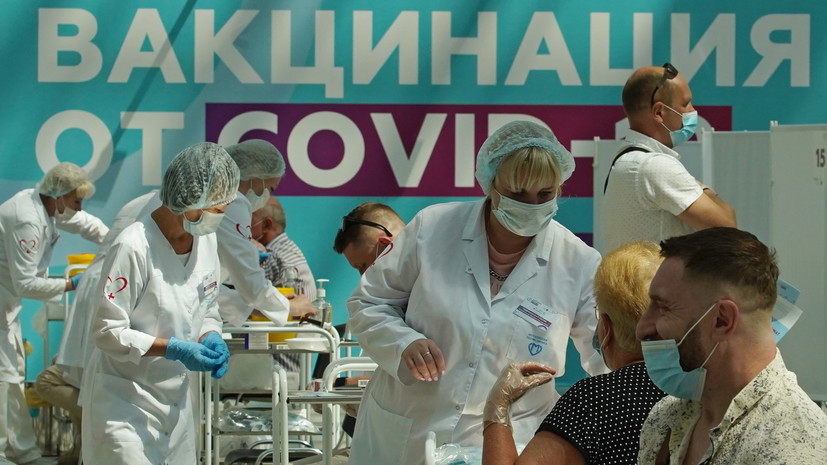Vaccines used as part of the COVID-19 vaccination campaign in Russia allow a rapid immune response to be formed.
This was stated by the Minister of Health Mikhail Murashko during the live broadcast "Let's Understand Vaccines Together" of the Russian Society "Knowledge".
The Minister pointed out the importance of vaccination during a pandemic.
"It is vaccination during this period that makes it possible to stop the development (of the epidemic. -
RT
)," TASS quotes the minister as saying.
He noted that it takes 42 days to develop immunity after vaccination.
“Let's gain time, let's be patient, let's all get vaccinated together, wait for that period.
We will gain more than getting the immediate benefit of going somewhere, communicating in a large team, ”said Murashko.
At the same time, according to him, all domestic vaccines are suitable for revaccination, including "Sputnik Light" - as the minister noted, the first consignments of this drug this week began to arrive in Russian regions.
The head of the Ministry of Health called on citizens to revaccinate six months after the first vaccination.
Also on russian.rt.com Revaccination against COVID-19 began in all vaccination centers in Moscow
COVID-19 statistics
In Russia, over the past day, the increase in cases of coronavirus infection amounted to 23 811. Moscow (3425), Moscow region (1965) and St. Petersburg (1940) are the leaders in the number of detected cases.
In total, 6,078,522 cases of COVID-19 have been recorded in the Russian Federation since the beginning of the pandemic.
Meanwhile, in Russia, over the past 24 hours, 22,547 people were discharged, and over the entire period the number of recovered patients reached 5,450,004. 795 patients died from complications that developed against the background of COVID-19 and concomitant diseases in the last 24 hours, and the total number of deaths reached 152,296.
According to Rospotrebnadzor, over the entire period of the pandemic, over 161.4 million laboratory tests for coronavirus were performed, including 551 thousand in the last day.
1.243 million people remain under medical supervision.
Also, the Federal Service for Surveillance on Consumer Rights Protection and Human Welfare told about the consequences faced by patients who have had COVID-19 with a severe course of the disease, RIA Novosti reports.
"According to the data of both Russian and foreign specialists, after the acute phase of the disease with a new coronavirus infection, 100% of patients experience general fatigue, muscle weakness, shortness of breath, and a decrease in exercise tolerance, especially among people working in hazardous working conditions," they said. at the Yekaterinburg Medical Scientific Center for Prevention and Health Protection of Industrial Workers of Rospotrebnadzor.
In addition, patients may experience chest pain, increased heart rate, anxiety, depression, sleep disturbances, cognitive impairment, joint pain, and hair loss.
In addition, the deputy director for clinical work of the FBSI MNIIEM named after G.N.
Gabrichevsky Rospotrebnadzor, Doctor of Medical Sciences Tatyana Ruzhentsova said that almost all patients with COVID-19 in moderate or severe form noted weight loss.
“If after the end of the course of treatment for coronavirus infection, body weight continues to decrease, then you need to contact a therapist or infectious disease specialist to establish the cause and receive recommendations for treatment,” the specialist explained.
In addition, as stated in the memo of the Ministry of Health for citizens on the prevention of complications after suffering from COVID-19, approximately 20-30% of those who have had coronavirus may experience thrombosis as part of the post-ovarian syndrome.
The most common complication after illness is shortness of breath (31.7%).
Also, those who had recovered complain of cough (13.5%), complaints of chest pain and tachycardia (12.7%).
Those who have had coronavirus at home, without hospitalization, may subsequently face complications, confirmed professor at the School of Systems Biology at George Mason University (USA), Doctor of Biological Sciences Ancha Baranova.
“For those who had been ill at home, without being admitted to the hospital, a long“ covid tail ”stretches for another three months, with reduced efficiency, with health problems, with visits to doctors ... Many people - at least 25% of those who have recovered - have neurological symptoms are delayed for a long time - for six months, for a year, "- quotes Baranova kp.ru.

